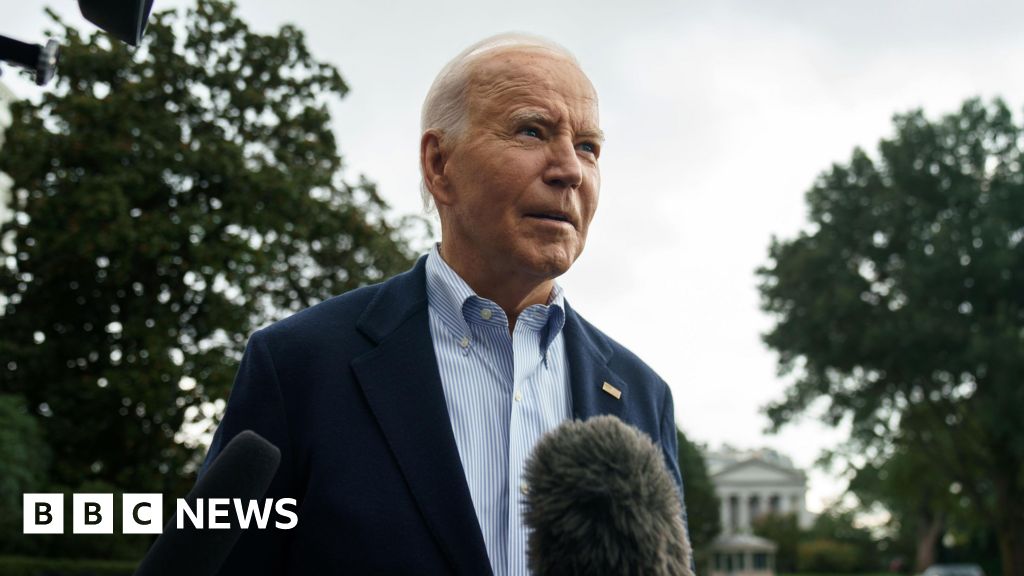Biden says US discussing possible Israeli strikes on Iran oil facilities

Joe Biden has said the US is discussing with Israel the possibility of Israeli strikes on Iran’s oil infrastructure.
When asked if he would support such strikes, Mr Biden said: “We’re discussing that. I think that would be a little… anyway.”
His off-the-cuff remarks, made as he left the White House, did not make clear Washington’s stance. Mr Biden has previously said he would not support Israeli strikes on Iranian nuclear facilities.
The price of benchmark Brent crude oil shot up by 5% immediately after the remarks. It has now increased by 10% since Iran’s large-scale missile attack on Israel on Tuesday.
Israeli Prime Minister Benjamin Netanyahu said Iran “will pay a heavy price” for Tuesday’s attack, which saw at least 180 ballistic missiles fired at Israel.
Satellite imagery published by the Associated Press news agency showed damage to the Nevatim airbase, one of the targets of the attack.
Iran said the barrage was a response to the killings of Hamas political leader Ismail Haniyeh, Hezbollah leader Hassan Nasrallah and Iranian Revolutionary Guards Corps commander Brig-Gen Abbas Nilforoushan.
Mr Biden told reporters that he was not expecting Israel to launch its retaliation on Thursday.
Asked as he left the White House what plans the US had to allow Israel to strike Iran, he responded: “First of all, we don’t allow Israel, we advise Israel and there’s nothing that’s going to happen today.”
A US official told Reuters news agency the US believes Israel is “still determining what exactly they will do.”
Mr Biden earlier said the US did not support strikes on Iranian nuclear facilities, as touted by some in Israel, including former Israeli PM Naftali Bennett.
Bennett argued striking Iran’s nuclear facilities could “help change the face of the Middle East” and “fatally cripple this terrorist regime”.
Reports in Israeli media citing local officials suggest Israel plans to first strike Iran’s oil facilities. If Iran then hits back, Israel will target its nuclear facilities.
Speaking on Wednesday, Iran’s chief of staff Maj Gen Mohammad Bagheri told state TV that it would hit infrastructure across Israel if it retaliates.
The barrage “will be repeated with bigger intensity and all infrastructure of the regime will be targeted”, Mr Bagheri said.
Mr Biden said on Wednesday he had consulted with the leaders of other G7 countries, who agreed Israel “has the right to respond, but they should respond proportionally”.
Fears over further violence between Israel and Iran, the world’s seventh largest oil producer, have put markets on edge.
Of particular concern is whether any escalation could block the Straits of Hormuz, through which a third of oil tanker traffic and a fifth of LNG frozen gas has to pass.
Related
Major military infrastructure upgrade completed at Leuchars
Upgraded facilities have been delivered for The Royal Scots Dragoon Guards and 2nd Battalion Royal Electrical and Mechanical Engineers, including refurbished o
UK public EV charge points surpass 75,000 as infrastructure booms
The UK’s electric vehicle (EV) charging infrastructure has hit a significant milestone, with the number of public charge points surpassing 75,000. According t
Infrastructure firm strengthens UK presence with Brierley Hill warehouse |…
National infrastructure service provider MJ Quinn has secured a newly refurbished industrial site in Brierley Hill as part of its ongoing UK ex
UK: Work Begins on New Railway Station in Okehampton
Initial work has begun to build a new railway station in Okehampton, Devon. The new 15 million GBP station, named Okehampton Interchange, will connect We













